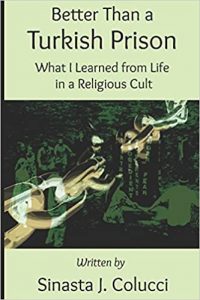By Brian Birmingham
Often when somebody exits an abusive group or relationship there’s an internal struggle in the person’s mind, in which one wonders about oneself, “How did I get involved in such a situation? Why did I stay involved for as long as I did? What’s wrong with me?”
Often, there is a lot of self-blame involved in leaving an abusive group or relationship.
It takes time for one to process such experiences. To figure out how and why it happened.
One of the most important things that a former member of an abusive authoritarian group, or “cult,” can realize, which will help in the recovery process, is that it’s not a question of “what is wrong with me?” But more pertinent and helpful, in terms of healing, is to question instead, “What was done to me while I was involved in the group, that made it so hard to leave for so long?”
This effectively reframes the recovery process from “What is wrong with me?” to “What was done to me?”
Once one comes to understand that there is an intentional planned process of coercive persuasion and thought reform involved and that the recruitment and indoctrination process was deceptive, then one is well on the way to genuine recovery regarding the pain inflicted by an abusive group or relationship.
 Sinasta J. Colucci understands this very well. And this understanding is reflected in the pages of his book “Better Than a Turkish Prison: What I Learned from Life in a Religious Cult.”
Sinasta J. Colucci understands this very well. And this understanding is reflected in the pages of his book “Better Than a Turkish Prison: What I Learned from Life in a Religious Cult.”
As far as I know, this is the first book ever written by a former member of the religious, Bible-based cult called the “Twelve Tribes.” And since I have recently reported about the death of Twelve Tribes leader Elbert Eugene Spriggs and his followers, it seemed meaningful to review this book, even though it was published in 2018.
“Better Than a Turkish Prison” is the story of how one young man got swept up into the highly controlling world of the Twelve Tribes, and his eventual disillusionment with and defection from the cult.
It’s as if Colucci did not so much “join” the Twelve Tribes, as he just intended to visit the Stepping Stone Farm in Weaubleau, Missouri in 2004. However, that visit turned into nine years.
Colucci was assimilated or absorbed in a what can be seen as a “Borg-like” hive. The Borg are a fictional sinister predatory alien group that appear within the Star Trek series. They are a cybernetic “Collective” and their motto is “resistance is futile.” Much like the fictional victims of the Borg Colucci was historically absorbed by Twelve Tribes.
However, Colucci eventually broke free, along with a woman he met in the group, who he later married.
It’s been said that nobody joins a cult, they just postpone the decision to leave.
Sinasta Colucci is a striking example of this truth, which he vividly explains in his book. He describes occasions in which he noticed hypocrisies and double-standards in the group’s lifestyle. Times in which Twelve Tribes teachings were not consistent with the way they were living and doing business.
However, despite these contradictions Colucci writes very plainly that the main reason he stayed for so long was because he once believed that there were no viable options for survival outside of the group.
At no point throughout the book does Colucci describe himself as a victim of the Twelve Tribes. Nor as a victim of its leader Elbert Eugene Spriggs.
And at no point does he ask “What was wrong with me? Why did I join? Why did I stay as long as I did?”
What Colucci does instead, at least in this reader’s opinion, is explain what was done to him. He also goes into the circumstances of his life, just before he was recruited at the age of nineteen. What made him vulnerable.
This is a unique book written by a former member of the Twelve Tribes. And as a former member with almost a decade of direct experience Colucci gives the reader a very good and insightful look into what life is really like day-to-day in the Twelve Tribes for both men and women. The author also provides interesting and valuable details about the group’s theology and practices.
For example: the description of how the loaf is made for the Sabbath-night “breaking of bread.” And details about Ha-Emeq (Marsha Spriggs, Yoneq’s wife) and her “Shiners” was intriguing.
Also, especially interesting are the descriptions of Spriggs’ personal behavior in Hiddenite; how he complained about his corn not being sweet enough. And how he made fun of a woman for being overweight. These insider accounts show Spriggs to be the hypocrite that he was.
My only criticism of Colucci’s book is that the last fifty or seventy-five pages, of the approximately two-hundred-and-fifty-page book, are basically a treatise on the author’s atheism. It seems to me that Colucci went from a preachy Twelve Tribes member to a somewhat preachy atheist.
Perhaps Colucci thinks that his current choice of atheism reflects his progressive path of enlightenment?
Or maybe this reader/reviewer is a bit oversensitive about this.
All in all, though, “Better Than a Turkish Prison: What I Learned from Life in a Religious Cult” is a good read and I recommend this book.




no comment untill now